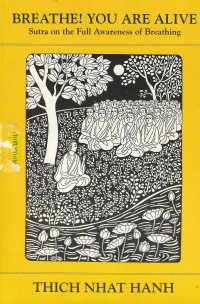 It’s been a year since Thich Nhat Hanh died; in researching how to say his name, I found a documentary made on the anniversary of his death where everyone was calling him by either his nickname or his birth name, so I’ve had to rely on the Wikipedia entry for pronunciation. Not that I’ll ever actually say his name aloud; mostly I just type it here in book reports (see also Thundering Silence and Peace of Mind: Becoming Fully Present).
It’s been a year since Thich Nhat Hanh died; in researching how to say his name, I found a documentary made on the anniversary of his death where everyone was calling him by either his nickname or his birth name, so I’ve had to rely on the Wikipedia entry for pronunciation. Not that I’ll ever actually say his name aloud; mostly I just type it here in book reports (see also Thundering Silence and Peace of Mind: Becoming Fully Present).
This book slots into the 2023 Winter Reading Challenge‘s “Religious or Spiritual” category. Originally, I picked up the Joel Osteen book I bought five years ago(?!), but it was more of a self-help book akin to Eat the Cookie, Buy the Shoes or The Power of Positive Thinking–although they include Bible versus, they’re not religious in theme–they don’t talk about the nature of the divine or the doctrines of a church.
This book, like Thundering Silence, is commentary and history of a particular Buddhist sutra. This one is a lesson on breathing by Buddha, sixteen practices or things that you can think while breathing in and out to calm your body, calm your feelings, calm your mind, and lead you to enlightment or closer thereto. It’s basically thirty-two lines of teaching wrapped in the story of where and when Buddha taught it (the sutra itself) followed again by historical analysis of how the Sutra (or sutta) was passed down, history of the sutra’s setting, and then commentary and expansion on the practices.
Basically, again, it’s breathing, but with each exhalation and inhalation, repeating to yourself to calm your mind, calm your feelings, understand the object of your mind, and then progressing at the last quartet into understanding the non-dual nature of everything and whatnot. So one can take it through the first three quarters of it and get a good course on mindfulness, but the last quarter goes into the unified nature of self and non-self that underlies Buddhism.
That, and the mention of the cycle of rebirth, are really the only Buddhist cosmology in the book, and none of the later evolved cosmic Buddhas (like Amida Buddha and whatnot). So very core, very original to the tradition. But the text itself was passed down for generations, popping up in Vietnam based on an earlier Chinese translation (or perhaps I got this backwards). So an interesting read and an educational read, but it has not convinced me to be a Buddhist.
To breathe a little deeper and talk to myself as I do so, sure.


